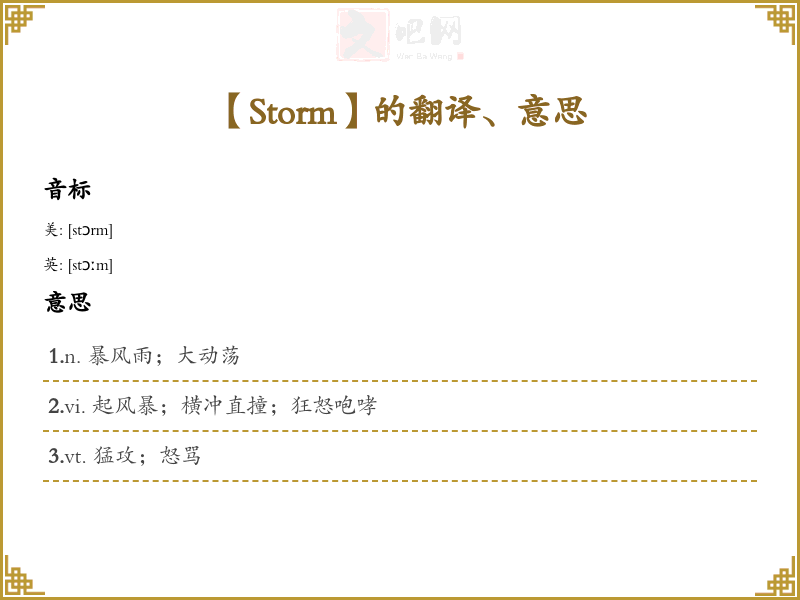【Storm】的翻译、意思
时间: 2025-01-24 15:59:25
【Storm】怎么读
美:[stɔrm]
英:[stɔːm]
【Storm】是什么意思、字义解释
1. n. 暴风雨;大动荡
2. vi. 起风暴;横冲直撞;狂怒咆哮
3. vt. 猛攻;怒骂
4. n. (Storm)人名;(瑞典)斯托姆;(德)施托姆;(英、西、芬)斯托姆
【Storm】的详细解释
英文单词学*与分析:[Storm]
1. 基本定义
- 字面意思:Storm 指的是一种强烈的天气现象,通常伴随有强风、降雨、雷电等。定义为:一种极端天气状况,特征是强风和降水,可能引发自然灾害。
- 词性:名词(noun)和动词(verb)。
2. 词源与起源
-
词源分析:
- “Storm” 源自古英语 “storm”, 其根源可追溯至原始日耳曼语 *sturmaz,意指“噪音、喧闹”。
-
历史背景:该词最早记录的使用可以追溯到公元前12世纪,常用于描述自然现象,并在文学中频繁出现,尤其是在史诗和民间故事中。
-
课本:
- 在**的教材中,通常出现在初中和高中英语课本中。
- 在牛津、美国的教材中,通常出现在中学阶段的阅读理解和写作练*中。
3. 使用场景
-
正式与非正式语境:
- 在正式场合,如气象报告、科学研究中的讨论中使用:“The storm caused significant damage to the coastal areas.”(这场风暴对沿海地区造成了严重损害。)
- 在非正式场合,如朋友间的对话:“Did you see the storm last night? It was crazy!”(你看到昨晚的暴风雨了吗?真疯狂!)
-
特殊场合:
- 在法律文书中,可能提到自然灾害的影响,例如保险索赔中提到:“The damage was caused by a storm, which is covered under the policy.”(损害是由暴风雨造成的,这在保单内有涵盖。)
- 在科学领域,气象学家会使用该词讨论天气模式:“The storm system is expected to move eastward.”(该风暴系统预计将向东移动。)
4. 示例句子
-
The storm last night knocked out the power in our neighborhood.
昨晚的暴风雨使我们社区的电力中断。
(出处:日常对话) -
Experts are predicting a major storm this weekend.
专家预测这个周末会有一场大风暴。
(出处:新闻报道) -
The children were excited to see the storm rolling in.
孩子们看到风暴来临时感到兴奋。
(出处:文学作品) -
During the storm, we took shelter in the basement.
在风暴期间,我们躲进了地下室。
(出处:个人经历) -
She weathered the storm both literally and figuratively.
她在字面和比喻意义上都经历了风暴。
(出处:文学作品)
5. 同义词与反义词
-
同义词:
- Tempest:指更为猛烈的风暴,通常指的是海上的风暴。
- Hurricane:特指热带气旋,强度更大,影响范围更广。
-
反义词:
- Calm:指没有风或风平浪静的状态,意指平静和安宁。
- Tranquility:意指宁静与和平,与风暴的混乱状态截然相反。
. 学方法
- 谐音联想记忆:可以将 “storm” 联想为“斯托姆”,想象一场 “斯托姆” 在你头顶上翻腾的场景,帮助记忆这个词的含义。
7. 关联词汇
- Thunder(雷声)
- Lightning(闪电)
- Rain(雨)
- Wind(风)
- Hurricane(飓风)
- Flood(洪水)
通过上述分析与学*方法,用户可以更深入地理解和运用“storm”这个单词。
【Storm】例句
1、[N-COUNT] A storm is very bad weather, with heavy rain, strong winds, and often thunder and lightning. 暴风雨
例:...the violent storms which whipped the East Coast.…席卷东海岸的猛烈暴风雨。
2、[N-COUNT] If something causes a storm, it causes an angry or excited reaction from a large number of people. 强烈的反响
例:The photos caused a storm when they were first published.那些照片最初出版时引起强烈的反响。
3、[N-COUNT] A storm of applause or other noise is a sudden loud amount of it made by an audience or other group of people in reaction to something. 暴风雨般的声音
例:His speech was greeted with a storm of applause.他的演讲博得暴风雨般的掌声。
4、[V-I] If you storm into or out of a place, you enter or leave it quickly and noisily, because you are angry. 气冲冲地走
例:After a bit of an argument, he stormed out.一次小小的争吵之后,他就气冲冲地走出去。
5、[V-T] If a place that is being defended is stormed, a group of people attack it, usually in order to get inside it. 猛攻
例:Government buildings have been stormed and looted.政府大楼已遭到猛攻和抢掠。
6、[N-UNCOUNT] storming 猛攻
例:...the storming of the Bastille.…对巴士底狱的猛攻。
7、[PHRASE] If someone or something takes a place by storm, they are extremely successful. 在某处大获成功
例:Kenya's long distance runners have taken the athletics world by storm.肯尼亚的长跑运动员在田径界大获成功。
